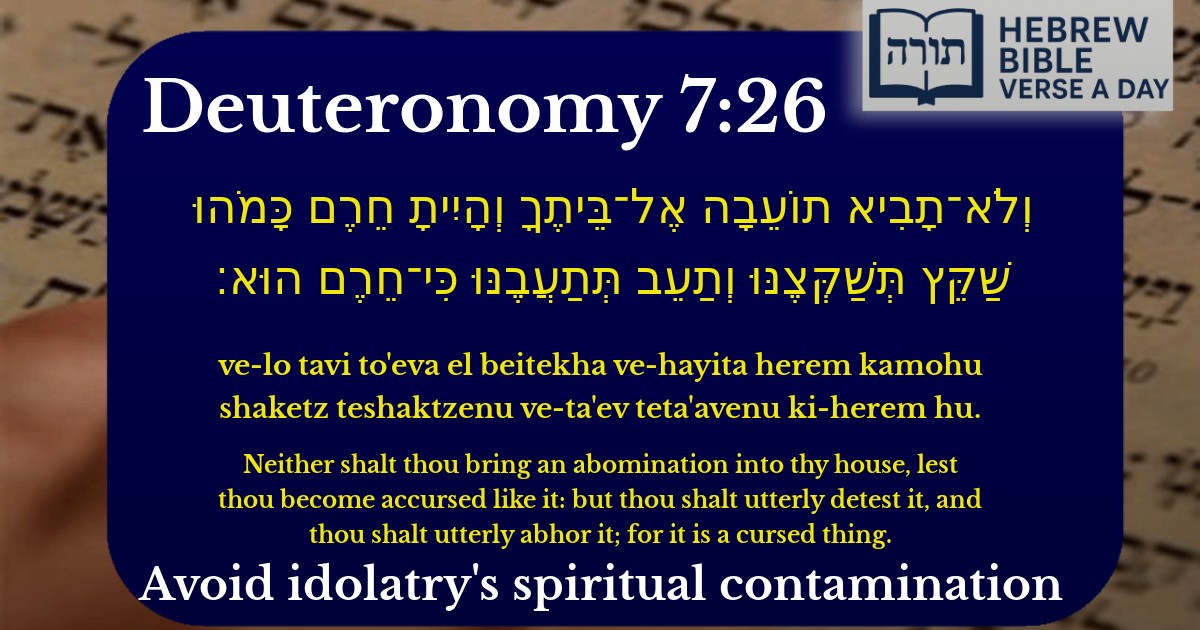Join Our Newsletter To Be Informed When New Videos Are Posted
Join the thousands of fellow Studends who rely on our videos to learn how to read the bible in Hebrew for free!
Hebrew Text
וְלֹא־תָבִיא תוֹעֵבָה אֶל־בֵּיתֶךָ וְהָיִיתָ חֵרֶם כָּמֹהוּ שַׁקֵּץ תְּשַׁקְּצֶנּוּ וְתַעֵב תְּתַעֲבֶנּוּ כִּי־חֵרֶם הוּא׃
English Translation
Neither shalt thou bring an abomination into thy house, lest thou become accursed like it: but thou shalt utterly detest it, and thou shalt utterly abhor it; for it is a cursed thing.
Transliteration
Ve-lo tavi to'eva el beitekha ve-hayita herem kamohu shaketz teshaktzenu ve-ta'ev teta'avenu ki-herem hu.
Hebrew Leining Text
וְלֹא־תָבִ֤יא תֽוֹעֵבָה֙ אֶל־בֵּיתֶ֔ךָ וְהָיִ֥יתָ חֵ֖רֶם כָּמֹ֑הוּ שַׁקֵּ֧ץ ׀ תְּשַׁקְּצֶ֛נּוּ וְתַעֵ֥ב ׀ תְּֽתַעֲבֶ֖נּוּ כִּי־חֵ֥רֶם הֽוּא׃ {פ}


Prohibition Against Bringing Abominations into the Home
The verse (Devarim 7:26) commands not to bring an abomination (to'eivah) into one's home, warning that doing so would render a person cherem (accursed) like the object itself. Rashi explains that this refers specifically to idols and items used in idol worship, which are spiritually contaminating. The Rambam (Hilchos Avodah Zarah 7:2) expands this prohibition to include any object associated with idolatry, emphasizing that even keeping such items for aesthetic or monetary value is forbidden.
Complete Rejection of Abominations
The Torah mandates not merely avoidance but active revulsion: "שַׁקֵּץ תְּשַׁקְּצֶנּוּ וְתַעֵב תְּתַעֲבֶנּוּ" ("you shall utterly detest it and utterly abhor it"). The Sifrei (Devarim 53) teaches that this language implies a requirement to cultivate an internal hatred for idolatry and its trappings, ensuring no trace of temptation remains. The Ibn Ezra notes that the double language (shaketz teshaktzenu, ta'av te'tavenhu) underscores the severity of the prohibition—both in action and thought.
The Nature of Cherem (Accursed Status)
The verse concludes by stating "כִּי־חֵרֶם הוּא" ("for it is a cursed thing"). The Ramban explains that cherem denotes something utterly forbidden and cut off from permissible use. The Talmud (Avodah Zarah 54b) derives from this that even indirect benefit from such items is prohibited. The Kli Yakar adds that bringing an abomination into one’s home spiritually aligns a person with its cursed state, jeopardizing their connection to kedushah (holiness).
Practical Halachic Implications